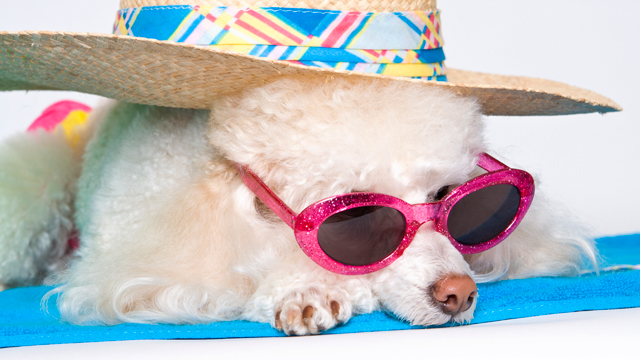We all love summertime and being outside! Getting together with family is an essential part of the summer experience. For many people, this ritual includes furry family members. While enjoying the warmer weather is fun, we all need to watch out for our pets and the hazards associated with the outdoors.
Water
Many dogs love to swim, and this can be a great way for them to cool off on a hot day. But there are risks associated with open-water sources. For instance, drinking too much water while swimming can pose a hazard. The water in rivers, oceans, lakes, and the swimming pool is full of things dogs should not consume. Dogs can pick up parasites, viruses, and bacterial or fungal infections. They can also drink too much, which may cause an irritated GI tract, resulting in vomiting, diarrhea, and an inability or lack of desire to eat. Carrying a travel bowl and a container of filtered water for your dog is a simple way to curb these issues.
General safety is another risk associated with swimming. Many breeds are not natural swimmers and could easily drown. Dogs that have seizures or are elderly should not be around water unless closely supervised. Using a dog-specific life jacket is always a good option.
Cars
Traveling with dogs and cats is a great adventure. Of course, pets provide companionship and love when experiencing new places. However, there are things to consider when bringing pets into your vehicle. Never leave your pet in the car alone, especially with the engine running. This opens the risk of your pet accidentally putting the car into drive or locking the car with the keys in the ignition. Although these events may seem uncommon,
they are possible and put your pet’s life in danger.
On hot days, never leave your dog in the car, even with the window rolled down, or even if you’re going to be quick. Only bring pets on the road with you if you are planning to have them by your side.
Pavement
Hot pavement can burn paw pads and be extremely painful for our pets. If you are in a position where you must walk your pet on pavement this summer, there are a couple of simple solutions. You can walk them early in the morning or later in the evening when the temperature has cooled down, or you can purchase dog shoes to help protect their feet. If you purchase dog shoes, make sure they fit appropriately so they do not cause rubbing irritations. You can always take your dog and the new shoes to your veterinarian to ensure you have the proper fit.
Sunbathing
Many dogs love to sunbathe and soak up the sun. However, our pets may not recognize overheating or sunburn. Yes, our pets can get sunburned! Dogs or cats with a recent summer clip, short fur, or light-colored fur seem to be predisposed to sunburn. Limit time outside for pets and make sure they always have access to a shady area and plenty of fresh water. When my bulldogs go outside, I set a timer to limit their exposure. On the “bully” topic, flat-faced animals or pets with certain medical conditions are not able to effectively cool themselves down and need even more supervision. If you are ever concerned about your pets, spray them down with room temperature water (avoid ice water), place a fan or AC near them, and then take them to the closest veterinarian. Heat waves are scary for people and animals, and can result in life-threatening emergencies.
Critters and Toxins
The heat brings out many wonderful critters. However, these critters may not play nice with your pets. If possible, keep pets away from long grass or wooded areas. If your pet has an encounter with a snake or spider, visit a veterinarian immediately. Also, keep pets up-to-date on monthly flea, tick, and heartworm prevention treatments. Ticks carry harmful diseases, fleas can cause anemia and transmit parasites, and heartworms can be fatal. Preventative care for our pets is life-saving.
There are also toxins and other hazards that pets are more likely to encounter when they’re spending more time outside. Common toxins we see in veterinary practice include antifreeze and rodent bait. Keep your pets away from these toxins, as they can be extremely dangerous and even fatal.
Fireworks and Storms
Is your dog an emotional wreck when thunder claps or fireworks boom? Loud and unexpected noises trigger the nervous system and can create stress for many pets. To ease your pets’ anxiety during these times, keep them indoors and provide a safe area where they can relax. Play music or turn on a TV to add an extra distraction, and keep windows closed. Anxiety prevention vests (or thundershirts) can also be helpful for calming nerves. Additionally, make sure your pets are micro-chipped and have proper identification in the event that they manage to escape. Dogs are more likely to be separated from their owners during these high-anxiety times.
There are many hazards that arise with summertime. With supervision and the guidance of your veterinarian, you and your pet can experience a wonderful and safe summer! Remember, a little extra time and forethought may prevent emergency vet visits and keep your pet happy and healthy.





